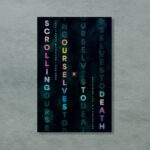When Hamas terrorists brutally attacked, raped, murdered, and kidnapped scores of Jewish people in Israel on October 7, one would think the brazen atrocity would galvanize the world in defense of Jews, a religious group that’s been persistently persecuted globally for thousands of years. But the opposite has occurred.
Recent scenes from around the world have shown just how deeply entrenched antisemitic hate still is, even in “cosmopolitan” Western cities like London, Paris, and New York. Anti-Jewish fervor has especially exploded on elite college campuses, with a 700 percent year-over-year increase in antisemitic incidents on campuses since October 7. It’s disturbing to watch protestors at Ivy League schools kick Jewish students in the stomach and yell, “Kill yourself”—or tell others, “Go back to Poland!”
But even if it’s on the rise currently, anti-Jewish sentiment predates October 7. Recently released FBI data shows that in 2022, more than half of all religion-based hate crimes in the U.S. were driven by anti-Jewish bias.
As Christians, we condemn racial and ethnic hate of every kind. But given our faith’s origins in Judaism and the significant moral, theological, and historical overlaps we share with the Jewish people, we should feel acute pain when they’re dehumanized and threatened.
As a way to better know the Jewish story—not just its traumas but also its joys—I’ve curated a list of movies that depict aspects of Jewish identity and experience. As always with a list like this, not every film will be appropriate for every viewer, so please exercise discernment and check out content guides. But by watching and sharing films like these, we can actively push back against the currents of dehumanization and erasure that threaten Jews everywhere.
Gentleman’s Agreement (1947)
Released just a few years after the world’s eyes were opened to the horrors of the Holocaust and the ugly outcomes of antisemitism, Elia Kazan’s brave drama was met with controversy but became a box office hit and won the Academy Award for best picture and best director. The black-and-white film stars Gregory Peck as a journalist assigned to write a feature story on pervasive antisemitism in New York City. In his research for the story, Peck’s character poses as a Jew and experiences prejudice firsthand. The film shows the subtle ways antisemitism is expressed—not just from outright bigots but also from “nice people” and liberal sophisticates who tout their tolerance. Not rated. Available to rent.
Exodus (1960)
Directed by Otto Preminger and starring Paul Newman and Eva Marie Saint (with a screenplay by famously blacklisted Dalton Trumbo), Exodus depicts the founding of the State of Israel in the years following World War II. Based on the 1958 Leon Uris historical novel of the same name, Preminger’s epic film is a commitment to watch; at three and half hours, it’s arguably overlong. But it’s a fascinating chronicle of the historical origins of the Jewish state—a triumph for the Jewish people that came shockingly soon after its greatest tragedy (the Holocaust). Not rated. Watch for free on Tubi.
Fiddler on the Roof (1971)
This classic movie musical is a bit dated and unabashedly cheesy at times. But the Norman Jewison–directed classic remains a joyful cinematic celebration of Jewish culture half a century after it was made. The recurring image and metaphor of the fiddler on the roof is memorable and effective, capturing the fragile place of Jewish existence in the world. As central protagonist Tevye (memorably played by Israeli actor Topol) puts it, describing his Jewish village in Eastern Europe, “Every one of us is a fiddler on the roof trying to scratch out a pleasant, simple tune without breaking his neck.” Rated G. Watch on Prime Video.
School Ties (1992)
Mostly remembered as a film featuring some of the earliest roles of future stars Brendan Fraser, Matt Damon, and Ben Affleck, School Ties feels timely again as an exploration of campus antisemitism. Set in an elite New England prep school in the 1950s, the film centers on David Greene (Fraser), a student-athlete who becomes popular on campus as the football team’s star quarterback. Yet when his Jewish ethnicity is revealed, Greene faces ugly prejudice and abuse. His experience no doubt resonates with many Jews worldwide, even today. Rated PG-13. Available to rent.
Schindler’s List (1993)
Many powerful Holocaust films came before and after Steven Spielberg’s Schindler’s List, but none seem quite as definitive, haunting, and memorable. Shot in black-and-white (with one devastating exception), the film won seven Oscars, including best picture. It follows the true story of a German businessman (Schindler, played by Liam Neeson) who rescues thousands of Polish Jews during the Holocaust. In supporting roles, Ben Kingsley and Ralph Fiennes deliver indelible, career-defining performances. Rated R. Watch on Prime Video.
The Prince of Egypt (1998)
One of the best cinematic depictions of exodus, this animated musical epic artfully explores what’s arguably the defining moment in Jewish history. Featuring beautiful animation and straightforward, old-fashioned storytelling, the movie is an enjoyable celebration of Jewish history for kids and adults alike. Rated PG. Watch on Peacock.
The Pianist (2002)
Based on a 1946 memoir by Polish-Jewish pianist, composer, and Holocaust survivor Władysław Szpilman, this harrowing drama is (in my view) second only to Schindler’s List in the canon of Holocaust films. Directed by Roman Polanski, The Pianist shows the stark evil of what was perpetuated against Jews, even as it finds hope in a narrative of survival, human dignity, and the beauty of grace. Rated R. Watch for free on Tubi.
Defiance (2008)
An inspiring tale of survival and resistance, Edward Zwick’s WWII film tells the story of the Bielski partisans. The inspiring film stars Daniel Craig, Liev Schreiber, Jamie Bell, and George MacKay as Polish Jewish brothers who outwit the Nazis in the forests of Belarus, ultimately gathering more than 1,000 Jewish refugees who effectively evade—and bravely fight—the Nazis bent on their annihilation. From a historical period that’s often unbearably bleak, Defiance tells a rare tale of successful resistance. Rated R. Available to rent.
Ajami (2009)
Cowritten and codirected by Scandar Copti (a Palestinian) and Yaron Shani (an Israeli Jew), Ajami weaves intersecting storylines that unfold in and around the Ajami neighborhood of Jaffa, in greater Tel Aviv. Major characters include Arabs, Jews, and Christians, and the film explores how their lives tragically intersect. Well received in Israel and elsewhere, the film was submitted by Israel for the best foreign language film Academy Award and was nominated. The harrowing drama is realistically shot with nonactors, alternates between Arabic and Hebrew languages, and gives viewers a compelling look at the tense realities of life on the ground in a combustible melting pot. Not rated. Available to rent.
A Serious Man (2009)
Many of the Coen brothers’ films can be seen through a lens of Judaism, but none are more directly Jewish than A Serious Man. After opening with a mysterious Yiddish folktale prologue, the film follows the life and trials of a Jewish-American family in 1960s Minnesota. Drawing heavily from the book of Job—a parallel that becomes especially obvious in the film’s final shot—A Serious Man is a moral fable that wrestles with man’s relationship with a God who sometimes feels distant or cruel. Rated R. Watch on Max.
Unorthodox (2013)
This independent documentary (not to be confused with the 2020 Netflix series) is a fascinating look inside modern Orthodox Judaism and the contemporary tension between secular rebellion or deconstruction and maintaining religious tradition. It follows three Jewish-American teenagers whose skeptical relationships to Judaism change when they go on a gap year program in Israel. Among other themes, the film shows the power of the community for shoring up tenuous faith. As in Christianity, so in Judaism: it’s hard to stay faithful when you’re surrounded by strong currents pulling you away from faith; it’s easier when you’re surrounded by fellow believers swimming together against the cultural tide. Rated TV-MA. Watch for free on Tubi.
Son of Saul (2015)
From Hungarian filmmaker László Nemes, this gripping, Auschwitz-set Holocaust drama deservedly won the Grand Prix at the 2015 Cannes Film Festival. The harrowing drama brings a new, visceral realism to the horrors of the Holocaust. By shooting in a claustrophobic 4:3 aspect ratio and putting the viewer relentlessly (sometimes dizzyingly) into the visual perspective of Saul (Géza Röhrig), Nemes brings a powerful subjectivism and slice-of-life intimacy to a dauntingly large and disturbing subject matter. Rated R. Available to rent.
Denial (2016)
Based on a true story, this riveting courtroom drama follows a legal case in which Holocaust scholar Deborah Lipstadt was sued for libel by infamous Holocaust denier David Irving. Featuring compelling central performances from Rachel Weisz as Lipstadt and the late Tom Wilkinson as the lawyer who defends her in court, Denial exposes the problem of attempted historical erasure and the fragility of “truth” in an age of online tribalism and reality distortion. At a time when many are already “erasing” or attempting to flip the script on the events of October 7, Denial is more relevant than ever. Rated PG-13. Watch on Max.
The Fabelmans (2022)
Steven Spielberg’s autobiographical family drama is about more than the director’s Jewish upbringing, but not less. The film shows how the iconic filmmaker’s moral imagination is deeply shaped by his religion, including his experiences as a boy of antisemitic bullying. It’s an enjoyable, poignant film that celebrates creativity, family, and Jewish identity. Rated PG-13. Watch on Paramount+.
A Tree of Life: The Pittsburgh Synagogue Shooting (2022)
This sobering documentary takes a look at the 2018 mass shooting at Pittsburgh’s Tree of Life synagogue, where 11 Jewish worshipers were slaughtered by an antisemitic gunman. The joy and enduring faithfulness of the Jewish community is noteworthy, even as they’re faced with lingering trauma and ongoing hate. It’s striking, for example, when one of the survivors comments on the antisemitic murderer, without excusing his actions, “I know he’s made in the image of God just like me. He’s a human being.” The Judeo-Christian value of human life’s inherent dignity shines in stark contrast with the cheapening of life displayed in senseless mass shootings. Rated TV-MA. Watch on Max.
Golda (2023)
Helen Mirren is characteristically great in this biopic of Israeli prime minister Golda Meir, which focuses on Meir’s leadership during the Yom Kippur War. The film is compelling not only as a chronicle of a pivotal military success in Israel’s history but also as a window into the fortitude, character, and compassion of the wartime leader. Liev Schreiber also shines as U.S. secretary of state Henry Kissinger. Rated PG-13. Watch on Paramount+.
“The Most Practical and Engaging Book on Christian Living Apart from the Bible”
 “If you’re going to read just one book on Christian living and how the gospel can be applied in your life, let this be your book.”—Elisa dos Santos, Amazon reviewer.
“If you’re going to read just one book on Christian living and how the gospel can be applied in your life, let this be your book.”—Elisa dos Santos, Amazon reviewer.
In this book, seasoned church planter Jeff Vanderstelt argues that you need to become “gospel fluent”—to think about your life through the truth of the gospel and rehearse it to yourself and others.
We’re delighted to offer the Gospel Fluency: Speaking the Truths of Jesus into the Everyday Stuff of Life ebook (Crossway) to you for FREE today. Click this link to get instant access to a resource that will help you apply the gospel more confidently to every area of your life.

































